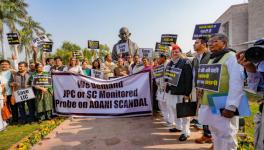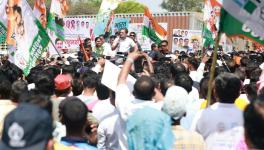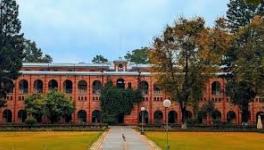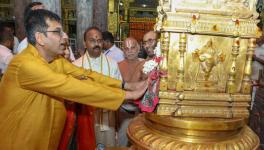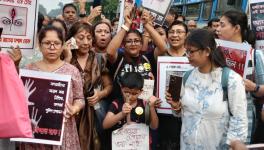How Mamata Banerjee’s National Ambitions Threaten Opposition Unity
Representational use only.
The Trinamool Congress, which humbled the Modi-Shah duo in the Bengal elections and energised the Opposition narrative for a while, has suddenly brought smiles back to the Bharatiya Janata Party (BJP) camp. The party’s ambivalence about chalking out a common agenda in the Winter Session of Parliament has become a cause of concern to other Opposition parties.
Remember, not often in the last seven-and-a-half years has the ruling dispensation been in such a defensive position as now. So much so, it was forced to repeal the three “black farm laws” when it confronted a mass movement. The movement is still on, and if the entire Opposition could have spoken in unison—as it did during the last Monsoon Session—the ruling dispensation would have an even more challenging time.
Close watchers of the unfolding political situation saw it coming. Two visits to the national capital by Mamata Banerjee, Chief Minister of Bengal, within merely four months, demonstrated vividly what the winds might blow in. The highlight of her latest visit was Banerjee meeting Prime Minister Narendra Modi—supposedly to discuss demands related to West Bengal and extend an invitation to him for the Global Business Summit next year in Kolkata. A supposed meeting with Congress leader Sonia Gandhi did not take place even though a section of the media and her party leaders had hinted it would.
Banerjee’s last visit to Delhi was in July 2021, merely two months after her party’s historic win in the West Bengal elections. Yet, that visit and the latest are a study in contrasts. She met several Opposition, leaders including Sonia Gandhi at her residence and Rahul Gandhi also attended. Talk about ‘strengthening opposition unity’ splashed across the media for a while. She met Nationalist Congress Party chief Sharad Pawar and then said, “There is no UPA [United Progressive Alliance] now,” a dig at the alliance of ruling parties led by the Congress party that was in power for two terms from 2004 to 2014.
All that talk is definitely over now, though few can be sure what transpired in these four short months. The idea of strengthening opposition unity is nowhere to be seen in the TMC’s plans, as we saw in its foray into other states and her focus on the northeastern states. Of course, the Congress has become a soft target for the TMC now, a trend that began with Tripura and later found place in Goa as well.
Nobody can challenge a political party’s right to expand in a democracy, but how it is unfolding, in this case, is jarring. Sushmita Dev, Rajya Sabha Member of Parliament, once a close confidante of Rahul Gandhi, and Mahila Congress leader, was the first high-level defection from the Congress. It was followed by a veteran Congress leader from Goa Luizinho Faleiro, who was chief minister in 1998-99 and had been with the Congress for four decades. Then Ashok Tanwar from Haryana, Kirti Azad from Bihar, and others left the party. The latest jolt to Congress is from Meghalaya, where thirteen of eighteen MLAs led by Mukul Sangma, a two-time chief minister, joined the TMC.
The question arises, what spurred this seeming shift in the TMC’s priorities?
Formally, it is being claimed that there is a “realisation” within Banerjee’s party that the Congress is “not serious about fighting the BJP”. Its failure to defeat the BJP in the 2014 election and oust it in 2019 strikes a contrast against the “Bengal experience”, which humbled the BJP. Banerjee herself talked about this situation in her October 2021 write-up, “Dellir Daak—Delhi Calling”, in Jago Bangla, the organ of the TMC. The magazine recently said the TMC is committed to fight the BJP and Congress in the “deep freezer”.
These moves could also be construed as part of the party’s strategy to gather enough strength nationwide to facilitate its own emergence as the pivot of anti-BJP forces at the national level, if needed, even if it means injuring the Congress.
One thing is certain. The party’s Mission India project also reflects the growing clout of election strategist Prashant Kishor within the TMC. Kishor—who supposedly crafted its victory in the last Assembly election. In the first press conference Faleiro addressed after joining the TMC, he demonstrated this when he said he had not yet met anyone from the TMC and that it is Kishor who met him and discussed the proposal.
After the West Bengal election, there were talks that Kishor would join the Congress party, and he is said to have met higher-ups in the party. But suddenly, the chatter around this stopped, and it became evident that relations between the two had soured when he tweeted against Priyanka Gandhi, who made national headlines after taking up the killing of farmers in Lakhimpur Kheri.
Last but not least, whether the changed priorities of the TMC has to do with the run-ins of Banerjee’s nephew Abhishek Banerjee with the CBI and now the Enforcement Directorate (related to alleged coal theft in West Burdwan). The gravity of the charges could be easily gauged from the fact that Abhishek, unofficial number two in the TMC, appeared before the Enforcement Directorate in September for interrogation.
No doubt, for the BJP, all these developments within the opposition spectrum are definitely a moment of cheer as of now. What happens next is right now difficult to predict. Maybe, instead of bickering, parties would rise to the challenge that majoritarian democracy poses.
The Sri Lankan scholar Stanley J. Tambiah famously called Sinhalas a “majority with a minority complex”. Does not this understanding resonate with what we experience in India? The majority community here dominates the social and economic sphere yet speaks and acts as if it is persecuted and hounded. The ascent of exclusivist Hindutva supremacism fosters and enhances this complex. The struggle to reclaim the values and principles of the Constitution—which is the antidote to the majoritarian project—will be long and needs everyone who supports it to unite.
The author is a freelance journalist. The views are personal.
Get the latest reports & analysis with people's perspective on Protests, movements & deep analytical videos, discussions of the current affairs in your Telegram app. Subscribe to NewsClick's Telegram channel & get Real-Time updates on stories, as they get published on our website.












